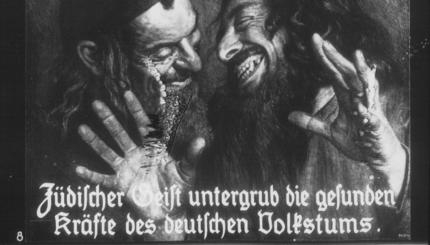When I was in my early 20s, I was cast as Golde in a production of Fiddler on The Roof in Mississippi. I was the only Jewish person in the cast. Yes, there are some pretty hilarious stories I can tell in conjunction with that theatrical experience—but the first time I wrote about this experience, I omitted this less-than-funny-anecdote: I was significantly younger than Golde is supposed to be, so a young makeup artist was helping me with old-age-makeup. After she finished applying the wrinkle lines around my eyes and mouth, she began rubbing something on my nose. I asked her what she was doing.
“Oh, it’s putty,” she said excitedly. “It’s to build out facial features and stuff. See, the family in this show is Jewish, right? So I figured you could use a bigger nose.”
“I’m Jewish, in real life,” I told her, leaning back and wiping the putty from my nose, “and I think my real nose will be just fine, thanks.”
“I had no idea,” she said, mortified. “I never met anyone Jewish, and…”
She didn’t finish her thought, but it was evident: you don’t look Jewish.
Apparently, whether or not a person has met anyone Jewish, there are still very prevalent stereotypes about what Jews look like. Dark hair, big nose, small stature, the old Eastern European Ashkenazi/Middle Eastern tropes of Semitic features. I have a few of those features, as it happens. I’m short. I have dark hair. I didn’t have trouble ‘blending in’ in youth group or anything. But this episode was neither my first nor my last brush with someone overtly referring to “looking Jewish,” and subsequently labeling me as someone who does or does not fit the bill.
Why are these stereotypes so persistent? Especially now, in 2017, in America— what does looking Jewish even mean, and why is it still a thing? As our friends on the Jewish& blog can assure you, not all Jews are of Eastern European descent (which, by the way, has always been the case—Judaism has been around for a lot longer than Jews have been in Europe, and while Judaism is a heritage and culture and yes, in the far-far-past was tribal—even in biblical times we accepted converts and were not homogeneous). There are Jewish people from different corners of the world. There are people who convert to Judaism. There are people who are adopted. There are people like me, who have one “born-Jewish” parent and one “chose-Judaism” parent – so 50 percent of my genetic makeup is Ashkenazi, but I also hail from various parts of Western Europe and North America (and probably other places, but despite all the compelling commercials I have yet to do one of those swab kits). The fact that we still assume there is a particular way to “look Jewish” boggles the mind.
But we do. And perhaps even worse than the idea that there IS a way to look Jewish is the notion that looking Jewish is a bad thing.
“You’re lucky,” I’ve been told more than once when someone discovers that my mother converted to Judaism. “That’s why you don’t look too Jewish.” (I’ve been told this by Jewish people more often than by those of other identities, by the way.) Incidentally, my blond-haired, blue-eyed, Jewish-on-both-sides-of-the-family cousins have been told the same thing. It’s meant as a compliment, but it’s worse than a backhanded one. It’s an insult to anyone who does, in the eye of that beholder, “look Jewish.”
There is some internalized and externally-confirmed notion that looking Jewish (read: looking “foreign,” looking “other”) is bad. That idea isn’t just bad for our demographic. It’s bad, in general. It contributes to the staggering amount of privilege and oppression in our society. It perpetuates damaging ideas of beauty, promoting pale skin and small noses and “just looking American” (read: white) as the ideal. It’s not welcoming. It’s not wise.
So what do we do about it?
We start with ourselves. Don’t assume that the person who walks into your Jewish building who “doesn’t look Jewish” is not, in fact, Jewish. Read the Jewish& blog. Remind yourself that there are many ways to look, and be, Jewish. And when someone else gets it wrong or makes an insensitive comment, be sure to kindly, clearly, and immediately wipe away the putty from your nose and wipe away the assumptions being made.



